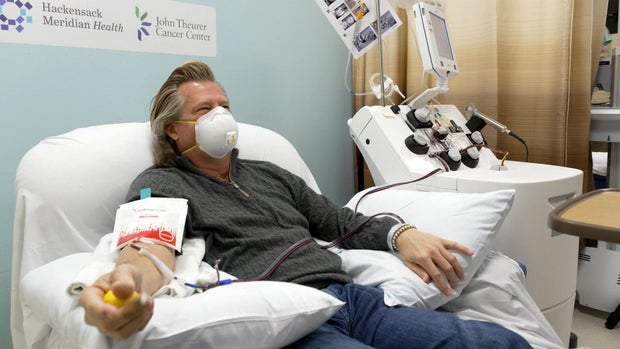[ad_1]
With the COVID-19 pandemic having entered its second year as a paramount threat to global public health, scientific bets placed during the earlier days of the medical battle are starting to pay off. Little more than a year after the discovery of the novel coronavirus in Wuhan, China, frenzied scientific inquiries are reporting out results.
In May 2020, 60 Minutes reported on one such project in a story we called, “The Promise of Plasma.” Correspondent Bill Whitaker profiled the work of Dr. Michele Donato, the chief of stem cell transplantation and cellular therapy at Hackensack Meridian Health’s John Theurer Cancer Center in northern New Jersey. Donato and her team quickly pivoted to respond to the pandemic and began investigating the use of blood plasma from high-antibody “super donors” who had previously recovered from a COVID-19 infection.
According to new peer-reviewed study results published in the medical journal JCI Insight last month, high-antibody plasma was shown to be safe and increase survival chances in newly symptomatic coronavirus patients. This specialized treatment proved most effective when given early in the course of an infection.
In the study, 51 patients were evaluated for their response to donated blood plasma with high antibody levels, or titers. Among study participants who were hospitalized with COVID-19 but did not need to be placed on a ventilator, survival rates increased over 16%.
“High-titer plasma, if used early in the process [of infection], is actually very effective,” Dr. Donato told 60 Minutes in an interview this week. “If it’s used late in the process, it probably is not the best option.”
High-titer plasma was also shown in the study to be less effective among mechanically ventilated patients. Donato said these patients were usually people in the inflammatory phase of the virus, in the second week of disease.
“Based on our results, I would not recommend [high-titer] plasma for people that are intubated in the ICU,” Donato explained.
Among willing plasma donors, Donato said that only about 20% were able to provide the high antibody levels the program sought to test.
The plasma program’s success has now led Hackensack University Medical Center to continue developing its plasma program. This ongoing work is being supported by a grant of over five million dollars from the U.S. Department of Defense. Phase 2 of Hackensack’s plasma study will aim to treat newly infected coronavirus outpatients with high-titer plasma within 96 hours of the onset of symptoms.
“We opened another study for outpatient plasma and in that study, people are eligible if they are within four days of symptoms,” Donato said. “I believe that is the window where plasma is most effective. Within 96 hours.”
Hackensack Meridian Health’s Dr. Michele Donato is also optimistic about the potential of using high-quality plasma to battle virus variants that have emerged. She explained that this will require community-specific approaches where variants have been found.
“As variants emerge, we need to be able to identify them. Once they have been identified in a community, then we need to have outreach to that community to collect and freeze plasma for that specific variant,” Donato said.
Asked about broad lessons from the ongoing pandemic, Donato said she was encouraged by the reaction of the medical research community. She cited the speed of progress and believes that is a good indicator for future viral threats.
“I think there are lessons in terms of how to very, very quickly deploy new therapies,” Donato told 60 Minutes. “What happened this year for us, being able to all work together so it happens extraordinarily quickly… we would be ready to do that again. It was a good exercise from that perspective.”
[ad_2]
Source link

